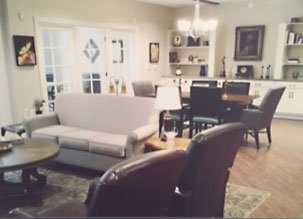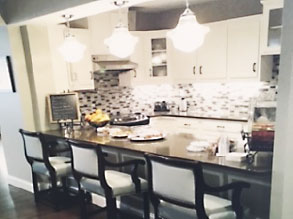
Liz Prosch
Liz Prosch, Vice President Mission Integration & Quality, Methodist Homes of Alabama and Northwest Florida
COVID-19 presents unprecedented challenges as we work to protect elders from this novel and highly contagious virus. COVID-19 forces us to be intimately familiar with pandemic infection prevention strategies and perfect our understanding of terms like “cohorting” and “social distancing.” At Methodist Homes of Alabama and Northwest Florida, who knew that the strategic decision journey to redefine home by embracing the household model over a decade ago would be so instrumental in our fight against COVID-19.
 In 2016, Methodist Homes, a non-profit, faith-based senior housing and long-term care provider based in Birmingham, Alabama embarked on a bold journey to depart from its traditional institutional operating model and launch a redevelopment plan making the household model a reality for residents at its two largest retirement communities, Fair Haven in Birmingham, and Wesley Place on Honeysuckle in Dothan. The household model, pioneered and developed by Action Pact, is a person-centered operational model that shapes the physical environment, organizational structure, and interpersonal relationships in ways that create an atmosphere of genuine home. Household kitchens, comfortable living spaces, the warmth of a fireplace and private rooms, among other amenities, surround the residents with the comforts of home. The heartbeat of each household is sustained by the relationships that grow between residents and associates who are consistently assigned to each household. Daily decision making is guided by a shared fundamental value that respects and honors the residents’ right to direct their own lives.
In 2016, Methodist Homes, a non-profit, faith-based senior housing and long-term care provider based in Birmingham, Alabama embarked on a bold journey to depart from its traditional institutional operating model and launch a redevelopment plan making the household model a reality for residents at its two largest retirement communities, Fair Haven in Birmingham, and Wesley Place on Honeysuckle in Dothan. The household model, pioneered and developed by Action Pact, is a person-centered operational model that shapes the physical environment, organizational structure, and interpersonal relationships in ways that create an atmosphere of genuine home. Household kitchens, comfortable living spaces, the warmth of a fireplace and private rooms, among other amenities, surround the residents with the comforts of home. The heartbeat of each household is sustained by the relationships that grow between residents and associates who are consistently assigned to each household. Daily decision making is guided by a shared fundamental value that respects and honors the residents’ right to direct their own lives.
The vision was realized in 2017 when Fair Haven and Wesley Place on Honeysuckle welcomed residents to new households founded on person-centered care values. The “new” Fair Haven features 63 private assisted living apartment homes and a redesigned memory care living environment both built in the household model and a newly constructed three-level nursing home. Each floor houses a distinctive household featuring twenty-one private accommodations.
 A new short-term Rehabilitation Inn also has two households with twenty-one private accommodations in each household. Wesley Place transformed an existing traditional skilled nursing facility into inviting neighborhoods and opened the doors to a new short-term care Rehabilitation Inn. At the Rehabilitation Inn, residents enjoy private accommodations, the smell of warm cookies from the kitchen, emotional support, and new friendships to support their recovery.
A new short-term Rehabilitation Inn also has two households with twenty-one private accommodations in each household. Wesley Place transformed an existing traditional skilled nursing facility into inviting neighborhoods and opened the doors to a new short-term care Rehabilitation Inn. At the Rehabilitation Inn, residents enjoy private accommodations, the smell of warm cookies from the kitchen, emotional support, and new friendships to support their recovery.
The household model is clearly enriching the lives and well-being of those who live and work at Fair Haven and Wesley Place on Honeysuckle. But, both communities are discovering even more household model advantages in response to the COVID-19 pandemic. Distinct households, private rooms and consistent assignment have become welcomed advantages as Fair Haven and Wesley Place on Honeysuckle respond to the COVID-19 pandemic. Separate households and private rooms make it easy for residents to socially distance and isolate when needed. Associates dedicated to each household help reduce the risk of COVID spread and supports good stewardship of personal protect equipment especially during times of limited supply. Two special isolation rooms, included in the design of Fair Haven’s new short-term Rehabilitation Inn, are now reserved and stand equipped to receive residents who may test positive for COVID-19. The Rehabilitation Inn’s household design at both communities make it easier to strategically cohort and manage the care for residents who are presumptive for COVID such as those newly admitted who have tested negative at the hospital but still require 14-day isolation and further testing in compliance with the communities’ testing strategy. As of this date, thankfully both communities are COVID-19 free. One community has remained COVID free since the beginning of the pandemic. At the other community, two residents have tested positive for COVID-19. In both cases, the community, in close collaboration with the local health department, responded with strict adherence to infection prevention protocols, environmental disinfection, active resident monitoring every shift, and proactive COVID-19 testing of residents and associates. Thankfully, test results confirmed no spread among residents and associates, and the community is currently COVID-19 free.
Protecting residents and associates from COVID-19 requires vigilance, teamwork, strict adherence to infection prevention protocols and cooperation among residents, associates, family members, and community partners. Every day presents new risks and complex challenges. The household model and a person-centered approach to care, however, make the journey easier for everyone. We are deeply grateful to all those on the front lines who are working hand-in-hand during this challenging time to create a home for our residents where the touch of God’s love is ever-present and ageless.



Thanks so much for a great article, Liz.
It’s wonderful to see what a difference Pioneer principles have made in protecting residents and staff from COVID 19! You describe beautifully the positive impact of consistent assignment, relationship based care, and decision-making by front-line staff who know residents best. And you provide a powerful depiction of how private rooms and physical arrangements such as the Household Model improve residents’ quality of life, and in this case, save lives!
What great timing. LaVrene Norton founder of Action Pact is my guest this month talking about this very subject. Please consider joining us next week on Friday, June 19 1 pm CT. She is calling it SLAM THE DOOR ON COVID! because that is what you can do in the household model. A big plus.
LaVrene will teach how household model organizations are by their very nature better suited to “stay-at-home” pandemic protocols than typical institutional model homes. Households have a front door that can literally be closed to all who do not live or work there. They have private rooms, and multiple common rooms in the living center (often a living room and a formal lounge, a den, a sun porch, family dining room, private back yard), all of which can contribute to the continuation of a good life. Households have a fully functioning kitchen and a large pantry that could accommodate a week’s food supply, minimizing potential exposure from both internal and external deliveries. Cross-trained consistent staff (including a house nurse) means fewer points of contact for each individual resident and staff member, which helps to keep everyone safe. With 12-20 residents, these self-sufficient households are still surrounded by all the resources they might need close at hand, and yet are able to keep them at arms’ length as much as possible.
Learn what your organization can do to move closer to this ideal. We also have a lowered rate for communities and free attendance to Ombudsmen, Educators, Surveyors, State and Federal Employees. For more info: http://actionpact.com/calendar/event_details/conversations_with_carmen_webinar
Congratulations Methodist Homes and thank you for sharing your lessons learned.